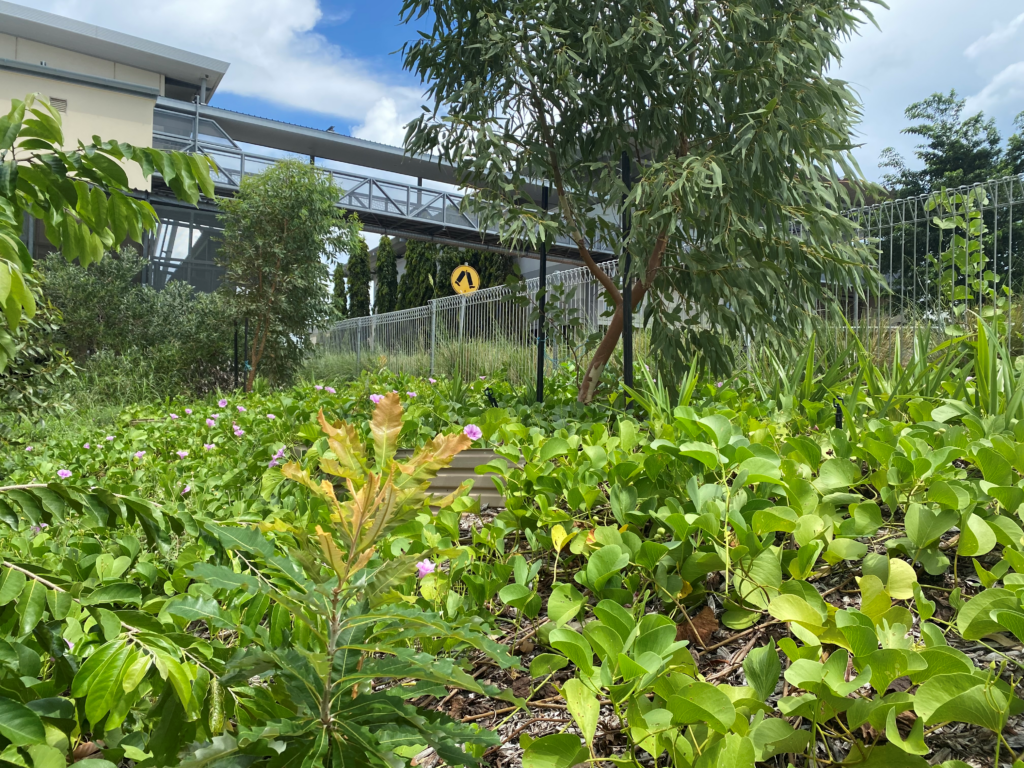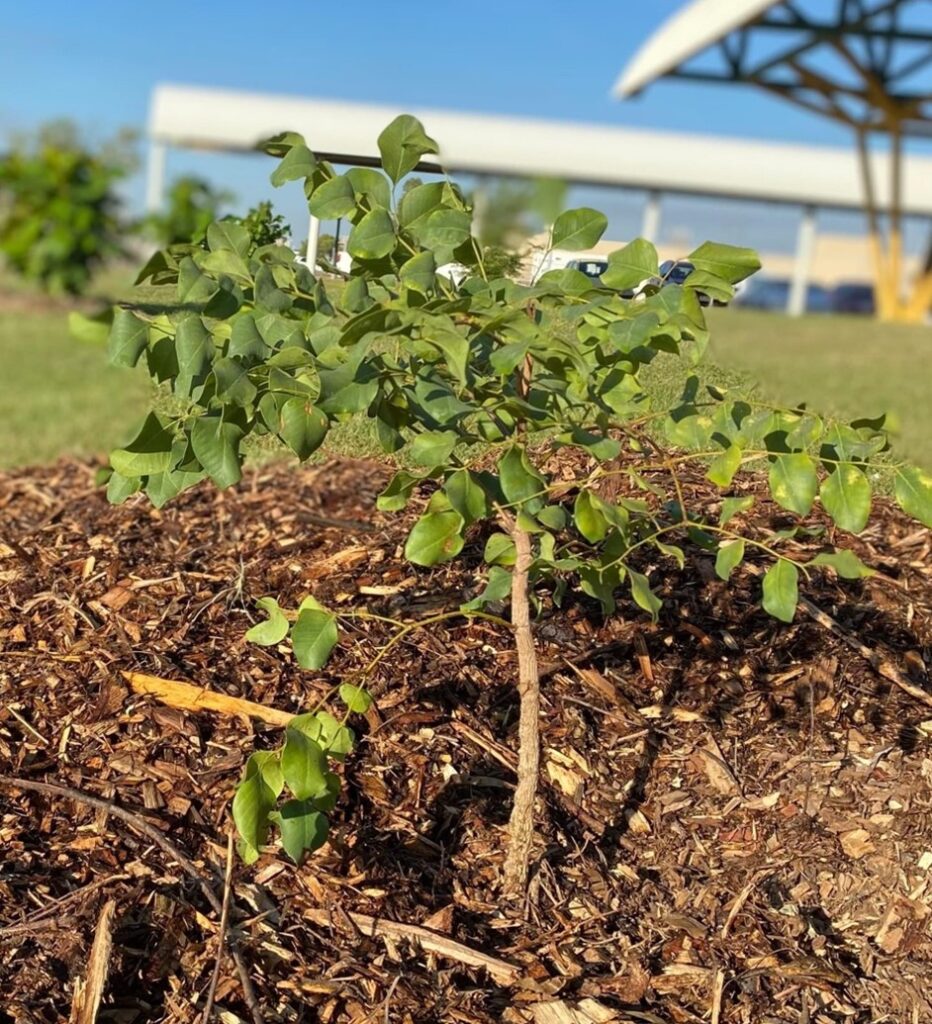A volunteer project at Royal Darwin Hospital (RDH) is using native landscapes to adapt to climate while enhancing wellbeing, Indigenous cultural security and local biodiversity.
Health campuses across Australia can improve wellbeing for both patients and staff by incorporating the natural environment using biophilic design. Biophilic design is an architectural approach to the built environment that enhances human function through nurturing connectivity with nature.
Today I’ll explore the use of biophilic design at the Royal Darwin Hospital. Our approach enables low-cost adaptation of existing health infrastructure to climate change, promoting local biodiversity, staff and patient wellbeing and reciprocal nurturing between campus users and the environment. It seeks to improve cultural security and health outcomes for Indigenous peoples who are over-represented in Australian hospitals, while providing a platform for First Knowledges to assist with climate adaptation.
Climate change poses a significant risk to the stability and wellbeing of the northern Australian health workforce. Northern Australia is at the forefront of climate change, and is predicted to be uninhabitable within a generation if we continue on our current emissions trajectory. Darwin’s worst-case scenario modelling predicts daytime temperatures will exceed 35°C for more than three-quarters of the year, as early as 2075. Rising exposure to heat and other environmental phenomena are set to disrupt societal wellbeing and further burden already struggling health services. There is evidence that climate change is exacerbating the Northern Territory’s health workforce shortages in underserved rural and remote areas.

Royal Darwin Hospital (RDH) is a 360-bed facility, run by the Top End Region of NT Health Service that employs more than 3400 staff. Hospital-based care at RDH may be world-class from a Western perspective, but imposes cultural challenges for Indigenous patients who constitute almost 31% of the NT’s population but 56% of inpatients and 83% of renal dialysis patients. National Indigenous rates of “discharge against medical advice” are five times higher than non-Indigenous rates, reflecting culturally unsafe hospital environments.
The causes for this disparity are complex, but encompass patients reporting loneliness, isolation and lack of cultural safety. Seventy per cent of Territorians who live remotely are Indigenous and reside in one of 600 communities or remote outstations. Access to specialist care by these patients comes at a price: separation from country, supportive family networks and place-based spiritual, cultural and healing practices that include the use of bush medicines.
Many Indigenous patients prefer to sit outside where they can also avoid constraint by walls and the built environment. This creates a double jeopardy of reducing access to health care that the Western paradigm restricts to hospital interiors, and socialises the perverse view of Indigenous “non-compliance” with ward-based care.
Cool, calm and connected: seeking healing and respite in nature
Hospital staff, patients and visitors of all cultures seek respite outdoors where they can engage with nature through restorative biophilic encounters. First coined by Fromm in the 1960s, biophilia is the innate human instinct to connect with nature and other living beings. A body of evidence now supports biophilic design of health care settings, with benefits to patients, staff and organisations.
Patients benefit through reduced blood pressure, reduced post-surgical recovery time and reduced need for analgesia. There is evidence that “nature prescriptions” reduce health care’s carbon footprint, may ameliorate stress-related and cardiometabolic disease and promote hospital recovery. Elderly patients, including those with cognitive impairment, may receive a substantial therapeutic impact from engaging in green spaces. Importantly, biophilic encounters in health care settings may be most restorative, even happiness inducing, when they assist individuals to contemplate the existence of a connected, mutually nurturing relationship with nature.

The benefit for staff
Biophilic encounters may assist health care staff to manage the mounting operational challenges imposed on them, which is essential in an era marked by unprecedented levels of stress, uncertainty and disconnection from nature. One National Health Service (England) study revealed that 90% of hospital staff desire to spend more time in green spaces. Benefits include feeling relaxed and calm, more productive on returning to their duties and positive impacts on physical and mental wellbeing. Spending time and undertaking activities in workplace green spaces is associated with significantly higher wellbeing ratings and is regarded as important when considering employment decisions.
Existing infrastructure, such as exposed footpaths, carparks and gathering places may be placing staff and patients at risk of heat stress even during brief journeys across the RDH campus, particularly between September and April. This experience is shared by hundreds of staff and clients of the co-located educational, research and ambulatory care organisations. Recent heat mapping by a staff-led project revealed that surface temperatures of exposed areas could exceed 65°C, which will only increase as climate change unfolds. This is problematic for heat-vulnerable groups who attend hospitals, including un-acclimatised recruits and the co-morbid, young and elderly. Furthermore, organisational provision of thermally comfortable outdoor spaces will be required to enact social distancing protocols for the pandemics of the future.
Greening the campus
The RDH Campus Greening Project was launched in 2021, and offers a template for climate adaptation and mitigation on heat-prone health campuses. Project leaders recognised that meaningful and timely climate action demands both organisation-led and grassroots engagement. They recruited donors, climate researchers, executive champions and volunteers from staff and community.
A respectful collaboration with Larrakia traditional healers and ethnobotanists has developed, emphasising plant species of cultural significance to offer a reference to homelands when people need hospital care. More than 1200 native plantings have occurred with over 150 local species, multiple species of cultural significance for the Larrakia. The important Deleynggwa (Ironwood, Erythrophleum chlorostachys) facilitates the hosting of smoking ceremonies on hospital grounds, and 18 native bird species have been sighted, including the endangered Gouldian Finch.
The project’s published case study has demonstrated a 29°C difference in land surface temperature between vegetated areas and surrounding paved surfaces. Staff, patients and community members express gratitude and report positive wellbeing impacts from the biophilic encounters created by these native landscapes, facilitated by new seating infrastructure.
Future directions include grant-funded ethnobotanical signage and developing an interactive, app-enabled digital network to plan heat-avoiding and biodiversity-embracing breaks. We anticipate increased literacy of First Knowledges and plan ongoing evaluation of the project’s performance as climate change unfolds.
Mark De Souza is a specialist emergency physician at Royal Darwin Hospital (RDH) who leads the RDH Campus Greening Project and is a member of Doctors for the Environment Australia
The statements or opinions expressed in this article reflect the views of the authors and do not necessarily represent the official policy of the AMA, the MJA or InSight+ unless so stated.
Subscribe to the free InSight+ weekly newsletter here. It is available to all readers, not just registered medical practitioners.
If you would like to submit an article for consideration, send a Word version to mjainsight-editor@ampco.com.au.

 more_vert
more_vert
Amazing work, and so important when the healthcare workforce is in crisis.
What a delightful example of the co-benefits of promoting biodiversity and human wellbeing.
Stepping outside work to a cool, green, living and nourishing environment should surely be a major attraction of working in Darwin Hospital.
About time. The stupidity of ward based care, especially with infectious diseases or mental health, will surely be remembered as a part of the dark ages of medicine.